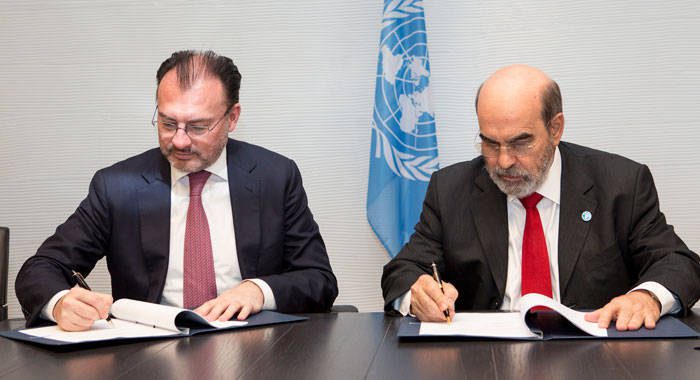SANTIAGO, Chile — St. Vincent and the Grenadines is among 14 Caribbean Community (CARICOM) countries that will design multiple projects to mobilise resources from international sources, which will allow them to improve the resilience and adaptation of their agriculture, food systems and rural communities to change climate.
The projects will be possible thanks to a new fund created by the Food and Agriculture Organization of the United Nations (FAO) and the Mexican Agency for International Development Cooperation (AMEXCID).
José Graziano da Silva, director general of FAO, and Luis Videgaray, secretary of foreign affairs of Mexico signed in Rome the agreement that creates the fund, which will have an initial budget of US$500,000, contributed in equal parts (US$250,000 each).
This capital will be used as a pre-investment resource that will mobilise millions of dollars for resilience and adaptation projects.
“Thanks to the support of the Mexican Agency for International Development Cooperation, 14 CARICOM countries will design 27 projects to mobilize resources against climate change,” da Silva explained.
“We all know that the Caribbean is one of the regions most vulnerable to climate change. We saw it in the last hurricane season, when the islands of Dominica and Barbuda were practically destroyed,” Videgaray said during the signing.
The countries that will develop the projects are Antigua and Barbuda, Bahamas, Barbados, Belize, Dominica, Grenada, Guyana, Haiti, Jamaica, St. Kitts and Nevis, St. Vincent and the Grenadines, St. Lucia, Suriname, and Trinidad and Tobago.
Ten of the projects will be presented to the Green Climate Fund, 12 to the Global Environment Facility and five to various European Union mechanisms. They will focus on vulnerable rural communities facing climate risks.
Exchange of experts to improve institutions
The fund between Mexico and FAO will also support CARICOM countries develop their institutional and technical capacities for planning, decision-making and project management, to enable them to better cope with natural disasters and extreme weather events.
Mexican experts and specialists from FAO will work side by side with their Caribbean counterparts in the design and implementation of the projects.
“The fund is a combination of financial resources and human resources,” Videgaray explained.
Building resilience is everybody’s job
Building resilience requires improving the quality of infrastructure through actions such as rectification and strengthening of river channels and burying power lines; but these are expensive investments and the Caribbean countries do not always have the necessary capital to implement them.
“That’s where international funds come in. This initiative from Mexico and FAO will allow countries to obtain much needed resources that are currently available but that many times Caribbean countries cannot access, because their projects have to improve from a technical standpoint,” Videgaray explained.
The Secretary of Foreign Affairs of Mexico explained that the fund signed between FAO and Mexico is an agreement open to other countries.
“We already have the good news that the government of Canada is going to come on board with resources, and this is key because the challenge is enormous. We must recognize that the Caribbean is not generating climate change but that it is one of the most affected regions, so we all have the responsibility to contribute” Videgaray said.






